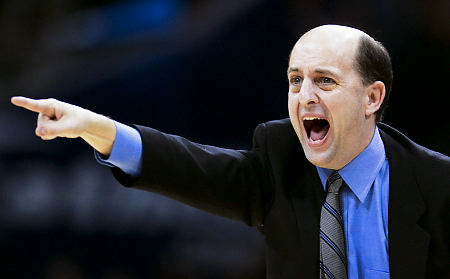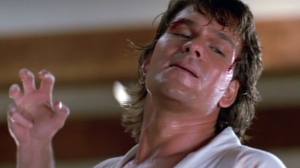The sage was at it again the other night during the Oklahoma City - Memphis NBA playoff game.
In case you don't know what I am referring to, former NBA head coach, and current TV analyst Jeff Van Gundy (JVG) dropped another bit of simple, yet essential knowledge about basketball that I think is also directly applicable to the workplace, management, and organizational dynamics.
By my reckoning, that is nothing new for JVG, and if you wish - you can check out the previous installments of the JVG 'wisdom' series here - (Parts I, II, III, and IV).
But back to the story. During the game Oklahoma City forward Nick Collison made a smart play on defense to cause Memphis to lose the ball, hustled to the offensive end of the floor, and then positioned himself properly to make a scoring move when the ball was rotated to him in the flow of the offensive play. It was a brief series of actions that were not necessarily terribly athletic or skilled or even that remarkable, but as a kind of orchestrated series did add up to an excellent and winning (apologies Chas. Sheen) play.
Immediately after Collison, who is not a starting or star player on the team, completed the play, JVG observed that winning teams need guys like Collison, players that may not have all the physical skills of the top players on the team, but have found ways to contribute using capabilities and attributes that are mostly 'choices' and not simply genetic gifts.
The money line from JVG:
'Guys like Collison, guys that grind, are essential. The best ones are coachable, accountable, and professional. And you can win with guys like that.'
Coachable - willing to accept suggestions, able to make adjustments in style of play to fit the team goals, and cognizant that what may have worked in the past (in college, or on former pro team), might not be the desired behavior on the current team.
Accountable - understands the role, knows how the role impacts and contributes to the success of the team, makes the effort to put himself in the right situations, and simply does his job fully knowing the rest of the team depends on him to meet his objectives. And if other guys on the team, maybe the star players, are having an 'off' night, then he knows when to try and give a little more than normally needed.
Professional - in the narrow sense, we are all professional, i.e. we are paid to perform. But what JVG really meant was a level of personal integrity, pride, and dedication to himself as a player, to his teammates, and to the supporters of the team. This means showing up and giving your best effort even when times are tough, when the team is down, or when you are not meeting your personal objectives. It means being proud of your contribution in every game, and even every practice. It means setting an example for others to follow, even if you don't hold a formal title or leadership role.
Coachable, accountable, professional. All important. All under your control every day. Super talented people in any game or industry or field can get away with only one or two of these, and can still make incredible contributions to the organization. But if you are like most people, and are not in that rare category of naturally talented superstars, just focusing on being coachable, accountable and professional will go a long way in determining your success in any role.
And stacking your team, no matter what the game, with those kinds of players will make you look pretty smart as a leader as well.
And that my friends, is the Wisdom of Jeff Van Gundy.

 Steve
Steve


